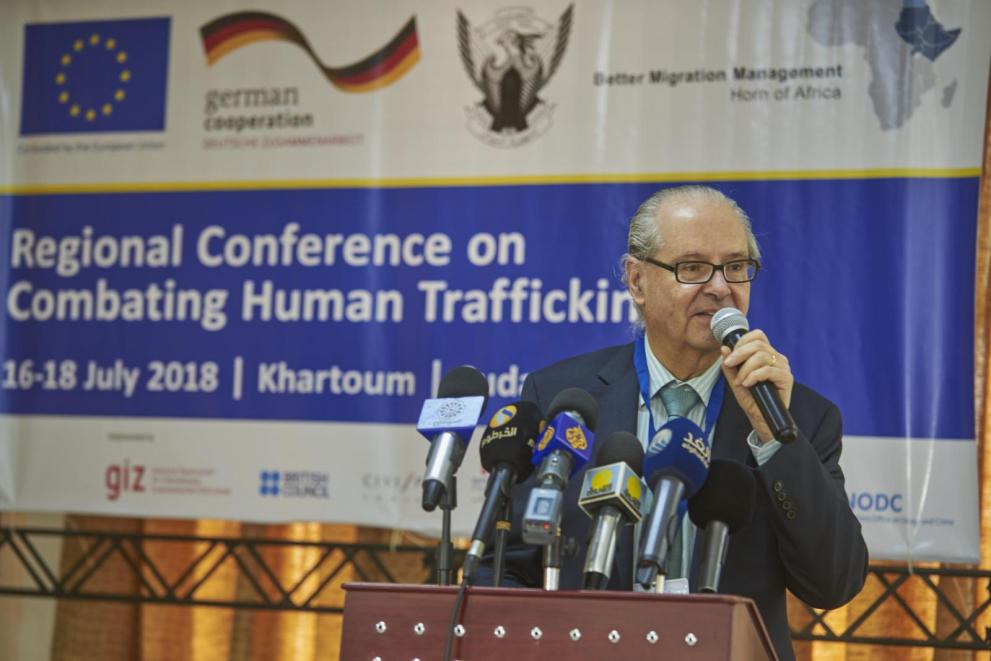
The Horn of Africa hosts more than 9 million displaced persons, many of which travelling irregularly, without visa or papers. Human-traffickers take advantage of these already vulnerable migrants often subjecting them to greater abuse, violence and exploitation. Sudan, Kenya and Djibouti, are main transit countries for Ethiopians, Eritreans, and Somali on the migration routes in the Horn of Africa, creating the need for a strong regional approach.
In this light, more than 80 representatives of national anti-trafficking bodies from Sudan, Ethiopia, Djibouti, Kenya, Uganda, South Sudan, Tunisia, Egypt, and Libya came together in Khartoum for the “Regional Conference on Combatting Human Trafficking” to exchange best practices and improve cooperation in combatting human trafficking. “It is our responsibility to harmonise our policies. We are in need of knowledge, experience, and training. The research exists in our countries. We have to use and share it with one another in order to halt human trafficking”, General Awad Alneil Dahiya, Sudanese representative of the Ministry of Interior said.
Four pillars were identified as key to a successful National Coordination System to combat human trafficking: prevention, protection and prosecution. Moreover, due to its strong cross-border dimension, the need for a common approach was defined as an underlying fourth pillar. Participants discussed how to harmonise the regional law enforcement structures and investigative approaches to get reliable testimonials and to improve cooperation and exchange.
The three day conference that included panel and group discussions set a strong emphasis on the support and protection of victims. “We have to make sure that the victims are not criminalised”, said Jean Michel Dumond, Ambassador of the European Union to Sudan in his opening speech. National Referral Systems in line with migrant services, especially vulnerable ones, such as women and unaccompanied minors, have to be harmonised in the region. The victims need a lot of support”, the Ambassador added. Furthermore, in order to bring human traffickers to justice, testimony is essential, and this will only be provided in safe circumstances.
Background
The “Regional Conference on Combatting Human Trafficking” was organised by the Better Migration Management (BMM) programme in cooperation with the Sudanese Government. BMM is funded by the European Union (EU) Emergency Trust Fund for Africa and the German Federal Ministry for Economic Cooperation and Development (BMZ). The programme aims to improve migration management in the region, and in particular to address the trafficking and smuggling of migrants within and from the Horn of Africa. The conference focussed on the Northern migratory route. In two consecutive events to follow, the focus will be on the Eastern and Southern Route.
More than 80 representatives from Sudan, Ethiopia, Djibouti, Kenya, Uganda, South Sudan, Tunisia, Egypt, and Libya came together in Khartoum for the “Regional Conference on Combatting Human Trafficking” on 16-18 July 2018. The participants met with representatives of international NGOs, national CSOs, relevant UN agencies, and interested diplomatic missions and shared their good practices and experiences on how to improve national counter-trafficking structures – including organisations such as IGAD, UNHCR, UNICEF, Uganda Coalition Against Trafficking In Persons or the Conseil national des droits de l'Homme (CNDH) from Djibouti.
Details
- Publication date
- 20 August 2018
- Region and Country
- Horn of Africa
- Thematic
- Improved migration management
- Partner
- GIZ
